Markets
When designing a humanitarian intervention and deciding whether to use CVA, a market analysis should be part of the overall response analysis. Supporting markets to function well has been shown to lead to faster recovery and increased resilience in disaster affected areas.
Many organizations have invested in the development of tools to support market analysis and are considering market-based programming more holistically. This includes interventions that use the market (such as cash transfers to affected populations), as well as interventions that directly support markets (such as conditional grants to traders to get their market back up and running).
Related initiatives
Featured content

Introduction to Market Analysis
Course
This 30 minute online course provides an introduction to the analysis of markets in emergency contexts, with input from some of the world’s leading thinkers on the topic.

A Practical Guide to Market Analysis in Humanitarian response
Course
A three to four hour online course designed to provide future humanitarian market assessment team members with a solid understanding of theory and steps of market assessments so that they can join assessment teams prepared with a basic understanding of what they will be doing and why.
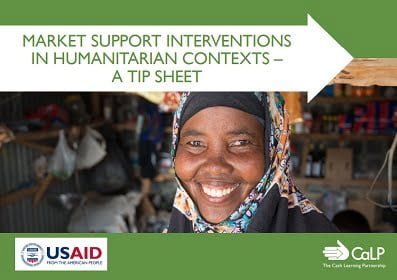
Market Support Interventions in Humanitarian Contexts – a Tip Sheet
Guidelines and Tools
This tip sheet defines what market support programming in humanitarian contexts is, and what it can look like in practice. It enables humanitarian practitioners to systematically consider market support interventions alongside other programme activities. The scope includes support interventions focusing on supply/availability and on demand/access. The tip sheet is based on secondary data...

Market Based Programming (MBP)
Guidelines and Tools
Market Based Programming (MBP) in Oxfam’s work means we always consider existing markets – through assessments, analysis and programming – across all phases of a response and across all technical sectors. You can also watch the videos below which are available in English, Spanish, Arabic and French.
Thematic lead
Latest
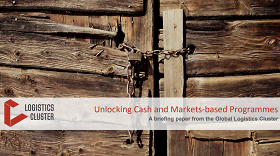
Unlocking Cash and Markets-Based Programmes
Report
In the aftermath of an emergency, humanitarian agencies are increasingly recognising the value of cash and voucher modalities, and market engagement. For Logistics and Supply Chain, our roles are evolving to embrace this trend, adapting our ways of working and even take on new responsibilities. Many...
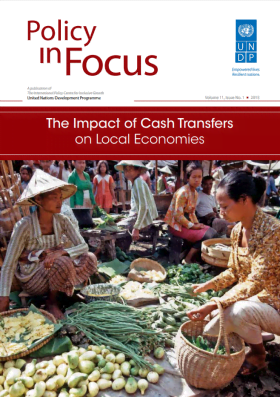
The Impact of Cash Transfers on Local Economies
Policy paper
In this special edition of Policy in Focus, leading authors and practitioners present their research on how cash transfers can impact the local economy when implemented in a developing country. The aim is to gather and review research results and evidence, obtained from various methodologies ranging from...

Exploring Food Assistance Programmes: Evidence for Lebanon
Report
The purpose of this study is to analyse how markets in Lebanon have responded to the increased demand from the Syrian refugees. More specifically, the study focuses on the micro-level impacts of market-based food assistance on the market supply chains and market performance. It explores the pros and cons...

Part 1.2 The Minimum Expenditure Basket
Report
The Minimum Expenditure Basket (MEB) is defined as what a household requires in order to meet basic needs – on a regular or seasonal basis – and its average cost. Determining the MEB serves three functions: a) it is a holistic reflection of need as perceived by crisis affected populations, including...

Strengthening Markets in Crisis
Presentation
All around the world, people depend on markets for their lives and livelihoods. But what happens to these markets when an emergency occurs? This video explains the concept behind cash, voucher and market assistance, which is rapidly becoming a modality of choice for humanitarian programmes engaged in...

Comparative Table of Humanitarian Market Analysis Tools
Guidelines and Tools
The increasing awareness of the need for market analysis has led to a plethora of guidance and tools with which to conduct this analysis. Choosing which tool is the right fit for your agency can lead to confusion and additional stress. This table comparing the market analysis guidance aims to: Provide a...

Multiplier Effects in Humanitarian Markets
Presentation
Cash, voucher and market-based humanitarian assistance stimulates local economies affected by an emergency. This video explains how, when emergency cash transfers are injected into markets, multiplier effects can yield long-term development and enable crisis-affected communities to rebuild their...
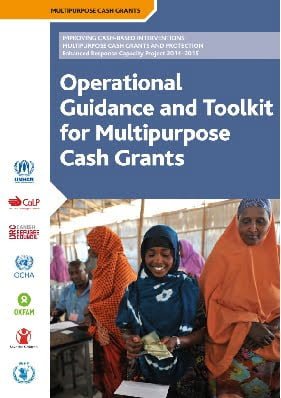
Operational Guidance and Toolkit for Multipurpose Cash Grants
Guidelines and Tools
This operational guidance and toolkit brings together worldwide expertise on cash-based interventions (CBIs). It provides comprehensive and practical guidance for humanitarian actors to assess the feasibility, conceptualise the design and structure the implementation of MPGs. The guidance focuses on...
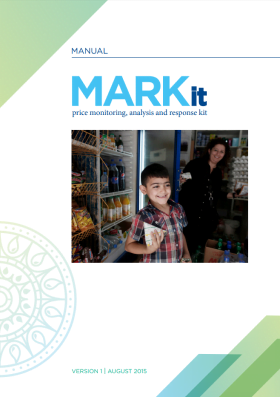
MARKit: Price monitoring, analysis and response kit
Guidelines and Tools
The Price Monitoring, Analysis and Response Kit (MARKit) was developed by representatives from the Local Regional Procurement (LRP) Learning Alliance to guide food assistance practitioners through the steps to monitor markets during the implementation of food assistance programs, and to ensure that...

Guidance Notes: Cash Transfers in Livelihoods Programming- West Africa
Guidelines and Tools
A growing acceptance of cash transfers as an inter-sectorial tool is accompanied by a better understanding of this approach and its potential to break the cycle of poverty, after much discussion on the role cash transfers have to play in building resilience. In the Sahel, food security experts have...

Overview: Rapid Assessment of Markets (RAM)
Report
The Rapid Assessment for Markets (RAM) provides a quick and basic snapshot of how key markets operate immediately after a shock, to support initial decision on feasibility of response options (cash vs in-kind, initial market support) and to identify whether or not more detailed market system analysis is...
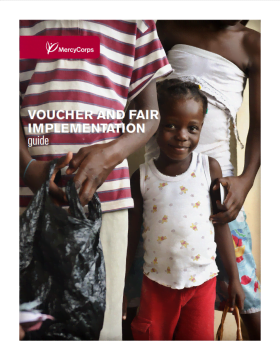
Voucher and Fair Implementation Guide
Guidelines and Tools
Mercy Corps’ Voucher and Fair implementation Guide provides clear, step-by-step guidelines for teams implementing cash, restricted cash, or commodity voucher programmes. Written for an internal audience, the Guide may also be useful for peer agencies.

Transcript: Market Analysis for Urban Humanitarian Response
Presentation
This is the transcript for ALNAP’s 12th urban webinar. The recording can be viewed here. This webinar focused on how market analysis can support effective urban humanitarian response. Alexandre Gachoud from Oxfam, Laura Phelps from NRC and independent consultant Emmeline Saint shared their experiences...

Cash Transfer and Community Resilience Programming in South Central Somalia
Blog Post
The Building Resilience in Central Somalia (BRCiS) attempts to provide immediate humanitarian assistance as well as developing longer term local capacity through a combination of locally adapted cash-for-work and unconditional cash transfers.
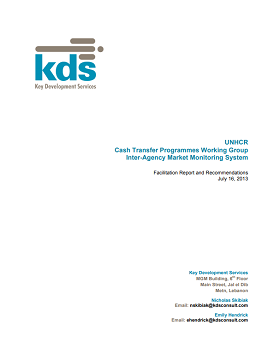
UNHCR Cash Transfer Programmes Working Group Inter-Agency Market Monitoring System
Report
The UNHCR engaged the Consultants for technical assistance in developing an inter-agency market monitoring system (MMS) to facilitate a national assessment of cash transfer programmes (CTP) within Lebanon. The request for assistance followed consensus among the International...
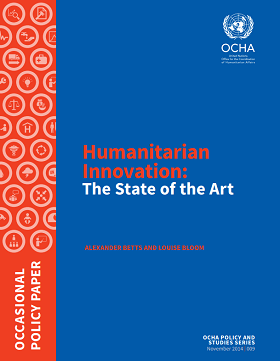
Humanitarian Innovation: The State of the Art
Policy paper
The humanitarian system faces grave challenges, as record numbers of people are displaced for longer periods by natural disasters and escalating conflicts. At the same time new technologies, partners, and concepts allow humanitarian actors to understand and address problems quickly and effectively....
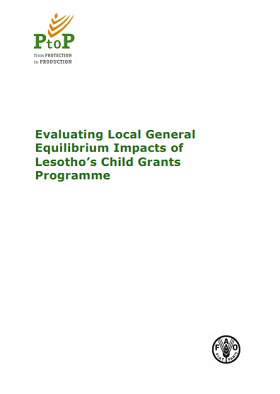
Evaluating Local General Equilibrium Impacts of Lesotho’s Child Grants Programme
Report
This report presents findings from a local economy-wide impact evaluation (LEWIE) of Lesotho’s Child Grants Programme. Simulations indicate that total income impacts significantly exceed the amounts transferred under the programme: each loti transferred stimulates local nominal income gains of up to...

Cash-for-shelter pilot findings in CRS’s Typhoon Haiyan Response
Report
In order to explore possible strategies for shelter assistance that would also benefit local markets, a cash transfer pilot study was conducted in which beneficiaries received cash to purchase shelter materials and to hire labourers. CRS promoted disaster-resilient construction techniques and employed a...
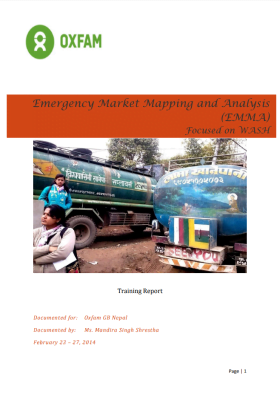
Training Report – Emergency Market Mapping and Analysis (EMMA): Focused on WASH
Report
Emergency Market Mapping Analysis (EMMA) is a toolkit guidance manual for humanitarian staff in sudden-onset emergencies which aims to improve emergency responses by encouraging and assisting relief agencies to better understand, support and make use of local market-systems in disaster zones. EMMA offers...
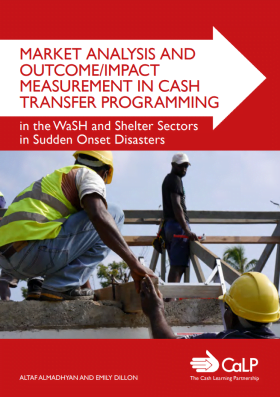
Economic Impact Study: Direct and Indirect Effects of the WFP Value-Based Food Voucher Programme in Lebanon
Report
This study examines the direct and indirect impacts of WFP’s e-card programme on the Lebanese economy. It is part of a broader United Nations initiative to assess the economic impacts of humanitarian assistance in Lebanon. The e-card programme is an important element of the international humanitarian...



